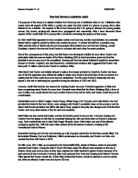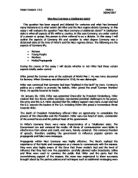Reducing the numbers of unemployed was Hitler's main priority. When Hitler came to power there were 6 million unemployed in Germany. June 1st 1933 'The Law to Reduce Unemployment' increased the number of Arbeitdienst (public work schemes,) that by March 1934 gave employment to 630,000 labourers. 1 billion Reichmarks were made available for housing, public building projects, land improvement schemes and autobahns. The Government increased public expenditure and tried to stimulate consumer demand, the unemployed benefited from the Nazi state. However there are other reasons why unemployment figures decreased: women, Jews and those in concentration camps were not counted in the figures. Part time work was counted as full time. The labour service was made compulsory from the June 1935 law. Jobs created were often tedious, for example jobs usually done by machinery were completed by hand and those in the RAD had to live in camps with no wages. So the employment figures did decrease which did benefit the people but there was exaggeration.
Hitler regarded the peasants as the purest racial element of the volk; they made up 29% of the total working population. The image of the nation working on the land was frequently used as Nazi propaganda. In fact the farmers were vital in Hitler's idea of Autarky. In the beginning the farmers did well under the Nazi Regime. Farm debts were paid off and they benefited from increased food prices in 1933-36. The Reich Food Estate, set up on September 13 1933 by Darre, responsible for all aspect of food production was deeply resented because they interfered too much. The Reich Entailed Farm Law introduced by Darre in September 1933 meant that farms of about 30 acres had to be passed onto the eldest son; this hindered the development of large scale modern farming units. The farmers lost out by reduction of prices for example a litre of milk was sold to the consumer for 20pf and the farmer only received 10-12pf. From 1934-35 there was mass exodus from the countryside as the rural farmers left due to poverty, poor housing and hard work. Between 1933-39 an estimated 1.5 million (12.5% of rural population) left the farms in search of a better life. Rich farmers benefited from the increase in land prices and did well out of Nazism, however the poorer farmers lost out, the very people who originally supported him.
The Nazis stressed the idea of a Volksgemeinschaft, a people's community of healthy, vigorous Aryans working for the good of the people. However anybody who did not fit into this category (known as the gemeinschaftsunfahig) were eliminated.
The Jews, lost out in German society, because they threatened the purity of German blood. Streicher organised a boycott of Jewish shops in April 1933, this proved not very successful as many Germans ignored it. (Jewish shops often undercut larger stores.) Legal measures included 'The Law for the Restoration of the Civil Service,' Jews could no longer be in the civil service, (7th April 1933.) The Nurembourg Laws (September, 1935) meant that Jews were no longer citizens of the Reich and that marital and extra-marital relationships between Jews and German were punishable by imprisonment. There were frequent attacks on Jewish people before 1938 by the SA, but nothing on any large scale. In November 1938, members of the SA and Nazi party attacked and burned down Jewish synagogs, homes and businesses. In total 91 were killed and about 30,000 were imprisoned during Kristallnacht. Jews were driven out of commercial life and deprived of means of livelihood. The children were expelled from school and university. In total 6 million Jews were murdered by the Nazis. The general populations view differed on the persecution of the Jews, from actively taking part in violence to hiding the Jews from the Gestapo.
The mentally ill were originally sterilised, but later the policy was changed to euthanasia. Between 1939-41 80 000 were murdered as they were seen to have unhealthy genes, a threat to the pure race. A special unit, T4, was established to kill disabled children and this was extended to adults. By 1944, 200 000 people were killed for mental and physical disabilities. The Nazis also targeted the 'asocials': vagabonds, gypsies, beggars, prostitutes, alcoholics, eccentrics, the work shy, homosexuals, minority religious groups, and juvenile delinquents. Homosexuals were seen as being against the laws of nature as they reduced the birthrate, 10-15 000 were arrested and sent to concentration camps.
'Kinder, Kirche, Kuche' were the three main roles of a German woman. Aryan women were vital to the future of the country to produce children. Their roles were to raise many children, look after the family and be a good homemaker. In Weimar Germany women were freed from many restrictions of pre-war Germany, the Nazis saw this as a sign of how corrupt Weimar Germany was. Women who enjoyed being a housewife thrived in Nazi Germany, however career minded women lost out as opportunities were restricted and female employment was reduced.
Children were seen as a vital ingredient to Hitler's Germany as future soldiers of the country and as wives and mothers. Various organisations were set up to brainwash the children and Schirach was given the responsibility of coordinating all youth groups and bringing them under control of the HJ. By 1935, 60% of all children belonged to one of the groups and enormous pressure was put on parents to allow their children to join. The Hitler Youth Law of 25th March 1939 made joining compulsory, they had no choice. The HJ was full of exciting activities and gave children independence but there was a large degree of regimentation and military training, which some protested against. The girls joined different organisations and by 1936, 2 million girls were members of one of the groups. The Nazis easily took in children; some children went as far as betraying their own parents for doing something 'un-Nazi' whilst others were less enthusiastic.
The Nazis took control of education and passed regulations to coordinate teachers and encouraging local Nazi officials to interfere in education. Many teachers were sympathetic to Nazis and by 1936 30% had voluntarily joined the Nazi Party. By 1937, 97% had joined the National Socialists Teachers' League. Members had to attend course stressing Nazi ideology and physical education. Any teachers not committed to Nazism were dismissed. The curriculum was changed to incorporate Nazi values. Numbers in higher education declined from 113 000 in 1933 to 57 000 in 1939. This reflected the downgrading of academic education. The education policies had adverse effects on the regime; by 1940's they did not have enough scientists to compete with other countries in research, therefore the Nazi policies led to less educated people.
There was tension between Nazism and the Churches, as a result of their conflicting ideology. The Nazis wanted to keep in favour of the churches because otherwise they would upset large numbers of Germans. However they wanted to control the churches and as a result in 1934 the German Faith Movement was set up, but was unsuccessful. In July 1933 a Concordant was signed between the Catholic Church and the Nazis. This granted them religious freedom and had to agree not to interfere in politics. This was a rejection of Hitler's process of coordination and the churches survived, much to Hitler's and the SA's discontent. On 4th April 1933 Hitler appointed Muller as National Bishop to lead all Protestants in the German Christian Church. Both Nazi and Protestant ideas equally dominated the ideology of the new church.
The Mittelstand were among Hitler's most committed supporters. They gained through new department stores being banned from 12th May 1933, half the consumer cooperatives were forced to close by 1935, the returns of business confidence (due to the improved economic situation) and the closure of Jewish shops.. However existing department stores continued to trade and by 1943 a quarter of a million small shops had gone out of business.
The upper classes were largely unaffected because Hitler realised that he had to work with them. Big business generally benefited from Nazi policies, share prices rose, annual dividends to investors increased as did management salaries. Amongst the industrialists there were winners and losers. Companies such as IG Farben were enormous winners whilst those such as steel manufacturers who refused to accept the 4 year plan tended to lose out. They all benefited from the destruction of the Trade Unions.
The idea of a classless society appealed to the working class however they lost out through the destruction of the trade unions. The German Labour Front (Ley) was created to look after worker's interests and they tried to break down barriers between employers and employees. However despite the rise in German productivity, wages only rose slightly and strikes were forbidden, they lost their freedom.
The Gestapo or the Secret State Police was created to enforce political conformity. They relied on denunciations by ordinary people, 26% of all cases came from reports from the general population and this demonstrates that people were willing to denounce their own neighbours for Nazism, showing extreme support. The Army had to swear an oath of allegiance to Hitler and the majority supported Hitler because he had eliminated their rivals, the SA. The Police, the SS and the SD were all coordinated and enforced Nazi Law; anybody who spoke out about Hitler was severely punished.
Few people dared openly criticise Hitler on mass scale. In particular two youth groups actively protested against him, the Eidelweiss Pirates and The White Rose Group. Opposition also came from the Church, some of the army, some elites, the Beck-Goerdeler Group, the Bomb Plot of 1944, Communists, Socialists and Industrial Workers, however they never posed a real threat.
In hindsight Hitler was regarded as a good leader. He brought prosperity to Germany through reduction of the unemployed, economic success, reduced crime rates and restored German pride. It is also argued that if Hitler had left office in 1938, he would have been remembered as an excellent leader. In August 1934, 89.9% of the population voted in favour of Hitler's unlimited powers, this shows people's support. In 1951 citizens of the Federal Republic of Germany were questioned and over half described the period between 1933 and 1939 as one in which things had gone best for Germany. However the consequences if you did not fit into Hitler's Volkgemeinschaft or dared to protest were horrific, for example the Jews. People were afraid to criticise the regime and this can be misleading when considering support. Freedoms were removed through the destruction of the Trade Unions, the right to vote, events such as the burning of the books (1933,) women's rights to work and people were brainwashed by Nazi propaganda. In conclusion some benefited from Nazi policies and others lost out, it was not at the expense of all people.







